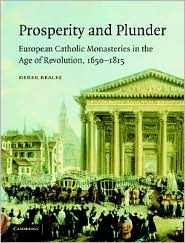

 |

|

The average rating for Prosperity and Plunder: European Catholic Monasteries in the Age of Revolution, 1650-1815 based on 2 reviews is 5 stars.
Review # 1 was written on 2013-09-01 00:00:00 David Carey David CareyI've read a lot of books on Monastic history...I know...don't let that put you off; and this volume is the most readable and singular treatment of the old Orders in the Period 1750-1810 that exists in English. Most monastic history is incredibly dry and self-absorbed. This history is expansive and understandable. So why is this period singled out? A huge number of monasteries where closed in most Catholic countries during this era. It is almost UN-immaginable to us now (they have since returned in smaller numbers), but even in Italy, The low countries, the Holy Roman Empire states, Austria, and of course France, many Benedictine, Cistercian, Carthusian, and Premonstratensian houses were boarded up, sold, pillared, and the inmates pensioned off. Not to mention the Jesuits were suppressed, and the mendicant orders made to defend their usefulness. This book explains the why and how of it all. The political, cultural and social reasons for such a purge are explicated. The artistic and educational loses are described. The ancient institutions could have been reformed, as they were many times in the past, but this time a hatchet was used instead of a scalpel. I completely recommend this book for interested students, for current or future monks, and for anyone who would like an explanation of the overlooked aspect of almost modern history! |
Review # 2 was written on 2015-10-28 00:00:00 Ilie Seuchea Ilie SeucheaPhilip III is quite unknown when it comes to the kings of Spain. A lot of it is not his fault. I personally think that he has been judged too harshly, and is actually a king that was relatively capable, just had the unfortune to inherit kingdoms that were so dependent on a workaholic ethic of it's previous 2 kings, that the entire nation started to decline when the new king couldn't match that energy. That said, i found this book a very tedious read. A lot of talk about the Dutch and how the peace came about, but it's just an endless circle with the negotiations that take too much of the book. Yes it was very important, but there were other parts of the "Grand Strategy" that imho deserved a lot more time in the book. It took me quite long to work through the book, which is usually i sign i shouldn't give it more than 3 stars. |
CAN'T FIND WHAT YOU'RE LOOKING FOR? CLICK HERE!!!